
The 2024 Global Food Policy Report
Avigator Fortuner/Shutterstock
Unhealthy diets underpin many critical public health challenges, including all forms of malnutrition and diet-related noncommunicable diseases (NCDs). At the same time, climate change is imposing new challenges on our food systems, including on the supply and nutritional content of our foods. These complex, interconnected challenges have brought global attention to the urgent need to transform our food systems in ways that ensure sustainable healthy diets are achievable for everyone.
The 2024 Global Food Policy Report reviews what we know about approaches across the food system to address desirability, affordability, accessibility, and availability constraints to achieving sustainable healthy diets and the challenges and opportunities going forward.
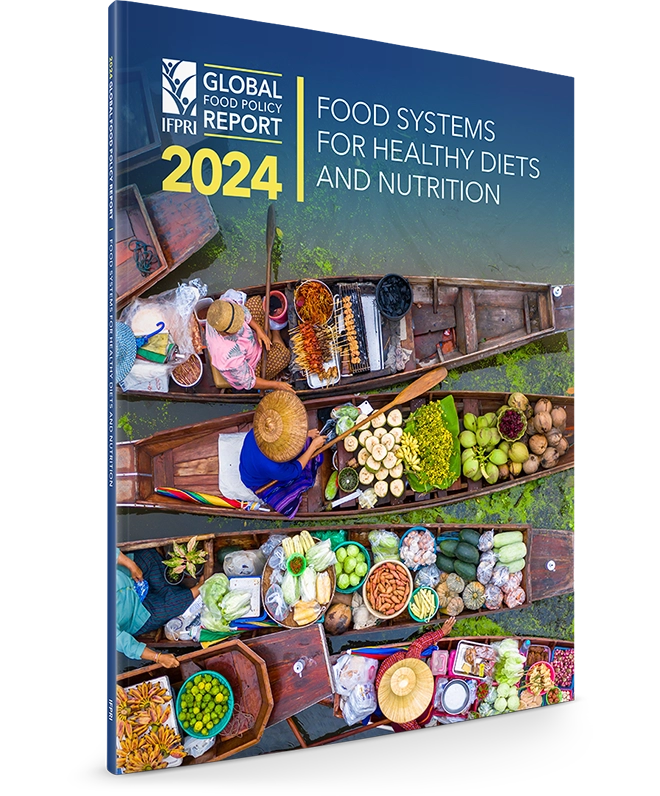
Foreword
The world is at a pivotal moment in our understanding of both the imperative to put healthy and sustainable diets within reach of all people and the pathways to reaching this goal. In recent decades, evidence has increasingly shown the critical importance of healthy diets for addressing all forms of malnutrition and improving a wide range of human health and welfare outcomes. Evidence is also growing on the environmental and climate impacts of our food systems and the foods that make up our diets. Global commitment to improving nutrition has risen in recognition of the unique potential of healthy diets to reshape the future for both human and planetary well-being, but there is still a long way to go.
… read more
Despite our understanding of the importance of healthy diets and the need for policies, programs, and innovations to improve diet quality, less than half of the world’s population consumes diverse diets that include adequate amounts of nutritious foods. Progress in addressing malnutrition has stalled in many places, and the impacts of climate change on food systems are becoming increasingly apparent. We are facing many challenges, but focusing on diets to improve nutrition and well-being can guide our efforts.
Moving forward on food systems transformation for healthier diets will require commitments to prioritize healthy diet goals for diverse population groups, as well as climate change adaptation and mitigation options that support these goals. Countries will need to identify policy choices, instruments, and actions with a focus on “multi-duty” options and “no-regrets” actions that address all forms of malnutrition and generate net benefits for people and the planet. Financial commitments to making healthy diets affordable, accessible, and desirable must be increased. For all of these efforts, governance will need to be strengthened to navigate trade-offs among development goals and powerful interest groups.
To support this critical effort, the 2024 Global Food Policy Report examines multiple approaches to addressing poor diets and nutrition from the demand and supply sides and through better governance that, when tailored to specific contexts, can promote a shift toward sustainable healthy diets. IFPRI’s many years of work on nutrition and food systems are brought together to provide a strong basis for moving forward. Our consistent focus on delivering evidence around policies and interventions, especially those promoting inclusion and equity for women and other vulnerable groups, will continue to support decision-makers and other food system stakeholders as the need to address diets becomes more widely acknowledged. Drawing on research from IFPRI, other CGIAR Centers, and many other colleagues, the report provides evidence-based policy recommendations at both the global and regional levels, and points the way for further research, analysis, and innovation. I would like to thank Purnima Menon and Deanna Olney for their guidance of this report as well as the many contributing authors and IFPRI’s Communications and Public Affairs team for this timely piece.
Healthy diets, sustainably sourced, should be a right for all of humanity. To strengthen human and planetary well-being, we need sincere efforts to address the many challenges impeding the achievement of this goal, especially for the most vulnerable people. We hope this report will provide both information and inspiration for all those contributing to the transformation of food systems for sustainable healthy diets.
Johan Swinnen
Director General, IFPRI
Managing Director, Systems Transformation, CGIAR

Themes
Food systems and diets underpin many critical challenges to public health and environmental sustainability, including malnutrition, noncommunicable diseases, and climate change, but healthy diets have the unique potential to reshape the future for both human and planetary well-being. Drawing on recent evidence and experience, the 2024 Global Food Policy Report highlights opportunities for transforming food systems to ensure sustainable healthy diets for all.
Advancing Nutrition
OVERVIEW
Leveraging food systems for nutrition requires a shift toward sustainable healthy diets that promote well-being for both people and the planet
Hunger, food insecurity, and unhealthy diets underpin many critical public health challenges, including all forms of malnutrition and diet-related noncommunicable diseases. These health outcomes, in turn, have short- and long-term impacts on the well-being and productivity of human populations worldwide. Amid these complex, interconnected challenges, the global focus on how to leverage food systems for nutrition has shifted toward sustainable healthy diets that promote well-being for both people and the planet. Sustainable healthy diets promote all dimensions of an individual’s health and well-being, and are accessible, affordable, safe, and equitable while being culturally acceptable and causing low environmental pressure and impact. Ensuring all of these characteristics is only possible if diets are considered within the wider context of the whole food system, from the farm to the consumer, and its links with numerous other sectors, from education to infrastructure.
By Purnima Menon and Deanna Olney
Diets and Nutrition
Anchoring sustainable healthy diets as a key outcome of food systems transformation helps prioritize diets as a critical way to tackle all forms of malnutrition
KEY MESSAGES
- Globally, consumption of most foods has increased, but less than half of adults consume diverse diets, and rising consumption of ultra-processed foods is a concerning trend. Efforts to increase the healthfulness and sustainability of diets must focus on quality — not just quantity — of food production or consumption to achieve optimal nutritional status across diverse populations.
- Understanding the drivers of individual food choices, consumer behavior, and food demand is essential to reshape food systems to achieve broad nutrition and sustainability goals. Although many initiatives to transform food systems and promote healthier diets focus on supply-side changes, actions must also focus on the demand-side drivers of food choices.
- Creating demand for sustainable healthy diets requires shifting personal and collective food choice behaviors. Demand-side actions can incentivize sustainable production of healthy foods and improve the enabling environment for healthy diets by influencing consumer preferences and increasing purchasing power.
- Key actions to shift demand include developing national food-based dietary guidelines that define context-specific diets, and promoting behavior change through consumer empowerment and food and nutrition education.
- Nutrition-sensitive agriculture programs, social protection programs, and school meals and school-based nutrition programs are also proven to improve diets and nutrition outcomes when selected and designed based on the intended objectives and context.
To generate and support demand for sustainable healthy diets, it is important to:
- Build understanding of the drivers of food choices, especially the perceptions and values of consumers.
- Develop food-based dietary guidelines to help consumers navigate their food environments and make healthy food choices.
- Strengthen social and behavior change communication to reach a wide audience and build practical skills that nurture an informed consumer base.
- Integrate multisectoral approaches, including agriculture, education, health, and economic policy, within the context of local food systems to help create an enabling environment for healthy food choices.
By Rob Vos, Arif Husain, Friederike Greb, Peter Läderach, and Brendan Rice
Demand-Side Approaches
Anticipatory action can deliver more effective humanitarian responses and support resilience building by preparing for crises in advance
KEY MESSAGES
- Globally, consumption of most foods has increased, but less than half of adults consume diverse diets, and rising consumption of ultra-processed foods is a concerning trend. Efforts to increase the healthfulness and sustainability of diets must focus on quality — not just quantity — of food production or consumption to achieve optimal nutritional status across diverse populations.
- Understanding the drivers of individual food choices, consumer behavior, and food demand is essential to reshape food systems to achieve broad nutrition and sustainability goals. Although many initiatives to transform food systems and promote healthier diets focus on supply-side changes, actions must also focus on the demand-side drivers of food choices.
- Creating demand for sustainable healthy diets requires shifting personal and collective food choice behaviors. Demand-side actions can incentivize sustainable production of healthy foods and improve the enabling environment for healthy diets by influencing consumer preferences and increasing purchasing power.
- Key actions to shift demand include developing national food-based dietary guidelines that define context-specific diets, and promoting behavior change through consumer empowerment and food and nutrition education.
- Nutrition-sensitive agriculture programs, social protection programs, and school meals and school-based nutrition programs are also proven to improve diets and nutrition outcomes when selected and designed based on the intended objectives and context.
To generate and support demand for sustainable healthy diets, it is important to:
- Build understanding of the drivers of food choices, especially the perceptions and values of consumers.
- Develop food-based dietary guidelines to help consumers navigate their food environments and make healthy food choices.
- Strengthen social and behavior change communication to reach a wide audience and build practical skills that nurture an informed consumer base.
- Integrate multisectoral approaches, including agriculture, education, health, and economic policy, within the context of local food systems to help create an enabling environment for healthy food choices.
By Sunny S. Kim, Nadia Koyratty, Christine E. Blake, and Neha Kumar
Diet Affordability
Shifting toward sustainable healthy diets will require bridging the gap between the current food budgets of the world’s poor and the high cost of nutritious foods
KEY FINDINGS
- Healthy diets that provide a range of safe and nutritious foods are not yet affordable for much of the world’s population, especially in South Asia and Africa. The cost of a healthy diet is defined as the least expensive combination of locally available items that meet a food-based dietary guideline. This metric, which is relatively new, indicates that between 2 and 3 billion people cannot afford a healthy diet.
- Poverty is a primary factor limiting diets. There is a huge gap between the current food budgets of the world’s poor and the spending needed for a healthy diet. Current social protection transfers in Asia and Africa barely begin to fill the healthy diet affordability gap.
- High prices of nutritious foods also limit access to healthy diets. Nutrient-dense foods — especially fruits, vegetables, and animal-source foods — are relatively expensive compared with calorie-dense foods, in part because agricultural policies and consumer subsidies have long favored production of staple crops.
- Provisional evidence suggests healthy diet costs are much higher in countries with poor transport, storage, and logistics infrastructure and services.
To shift actual diets toward healthy diets, we need to:
- Improve national and subnational monitoring of healthy diet affordability, including food prices, expenditures, and wages, in order to strengthen knowledge and provide a strong platform for nutrition interventions.
- Accelerate pro-poor economic growth in low- and middle-income countries (LMICs) through reforms to catalyze more equitable and inclusive growth.
- Increase availability and reduce prices of nutritious foods by repurposing agricultural policies toward nutritious foods and increasing investment in transport, infrastructure, and logistics.
- Scale up nutrition-sensitive social protection in LMICs, including appropriate targeting of vulnerable groups, delivering transfers that come closer to bridging the healthy diet affordability gap, and linking social protection with nutrition education interventions that increase demand for healthy foods and decrease demand for unhealthy foods.
By Derek Headey, Kalle Hirvonen, Harold Alderman, Saskia de Pee, and Kalyani Raghunathan
Food Environments
Food environments warrant attention to better understand how they affect diets and to develop policy actions that promote sustainable healthy diets
- Food environments in low- and middle-income countries (LMICs) are undergoing dramatic changes. Their important role warrants attention from researchers to better understand how they are impacting diets, and from decision-makers to develop policies and actions for food environments that promote sustainable healthy diets for all.
- Ultra-processed foods are now ubiquitous and heavily consumed in both urban and rural areas. These cater to increasing demand for convenience from busy consumers and are heavily marketed, especially to children and adolescents.
- Fruits, vegetables, and other nutrient-dense fresh foods are often available from informal vendors in LMICs, but food safety remains a serious challenge, and availability is subject to high postharvest losses, deterioration in quality, and seasonal fluctuations.
- Online grocery and food delivery services are changing how consumers engage with food environments, while social media is opening up new avenues for marketing and advertising of (primarily unhealthy) foods that are difficult to monitor and regulate.
A variety of policies and actions can improve food environments to promote sustainable healthy diets:
- Mandatory front-of-package labeling systems and taxes have reduced consumption of unhealthy foods and beverages in LMICs, particularly in the Americas, and could be expanded to other regions.
- Restrictions on marketing of unhealthy products, especially to children and adolescents, hold promise for reducing consumption of ultra-processed foods but require further evaluation.
- To address new threats created by the digital food environment, valid metrics for monitoring and research are urgently needed to assess the impact on dietary habits and to inform effective, enforceable regulation of marketing.
- Policies and actions designed to promote access to healthy foods, including fresh produce and animal-source foods, require further research in LMICs. Studies examining subsidies for healthy foods and retail-level interventions such as product placement have been limited to high-income countries, and those for retail-level interventions are still inconclusive.
By Gabriela Fretes, Quinn Marshall, and Jef L. Leroy
Plant-Source Foods
Plant-source foods deliver energy and important nutrients, but policies and investments are needed to improve production and consumption of these foods, especially among vulnerable populations
- Food crops are key components of sustainable healthy diets. These crops, which include fruits, vegetables, and nutrient-enriched and whole grain staples, deliver energy and high concentrations of health-promoting vitamins, minerals, phytochemicals, and dietary fiber.
- Unhealthy diets are the leading behavioral risk factor for diet-related noncommunicable diseases (NCDs) and a major contributor to globally prevalent micronutrient deficiencies. Dietary improvements can meaningfully reduce NCD-related deaths and help address deficiencies in essential nutrients.
- Consumption of fruits and vegetables remains inadequate among many at-risk populations due to limited availability, affordability, and taste preferences, among other factors.
- Access to affordable and high-quality food crops for the poor in low- and middle-income countries is a global equity, health, and sustainability challenge. Seasonality, perishability, price instability, and household incomes, among other factors, shape the production of and access to non-staple food crops; consumption of staple crops remains relatively stable.
- Proven technologies, such as biofortification and some postharvest food processing techniques, can be scaled up to leverage crops for sustainable healthy diets.
To improve the contribution of plant-source foods to sustainable healthy diets, it is important to:
- Promote policies and accessible technologies that produce and supply more nutritious crops and foods, along with behavioral strategies that shift demand and consumer actions toward a sustainable healthy diet.
- Promote production and consumption of biofortified or fortified staple foods as complementary nutrition strategies where needed. These foods can be an equitable and affordable means of delivering nutrients to especially vulnerable populations, including women and children.
- Prioritize investments in crop diversity that can lead to increased accessibility, affordability, and appeal of safe and healthy diets when carried out alongside upgrades to market infrastructure and nutrition and hygiene education among farmers, value chain actors, and consumers.
- Create an enabling environment, supported by government and financial commitments, for scaling up crop-focused initiatives that can achieve nutrition and climate goals through holistic and context-specific multisectoral interventions that span agriculture, food, trade, and social protection.
By Erick Boy, Inge D. Brouwer, Jen Foley, Natalia Palacios, Samuel Scott, and Victor Taleon
Animal-Source Foods
Incorporating animal-source foods into sustainable healthy diets will require shifting consumption patterns around the world to benefit human health and planetary well-being
- Animal-source foods (ASFs) are an excellent source of high-quality proteins and bioavailable micronutrients that can be difficult or impossible to obtain from plant-source foods. ASFs are particularly important for individuals with high nutrient requirements, such as young children.
- ASF consumption can contribute to negative health outcomes. Processed meat is known to be carcinogenic; however, the association between noncommunicable diseases and consumption of unprocessed red meat and saturated fatty acids continues to be debated. Unsafe animal products are an important contributor to foodborne disease worldwide.
- Global livestock production has substantial negative effects on the environment, but the impact varies widely by type of ASF, production system, and region. The largest impacts are seen with ruminant production.
- Demand for ASFs is growing and expected to grow further, particularly in low- and middle-income countries (LMICs), due to urbanization, changes in dietary preferences, and population growth.
More sustainable and healthy consumption of ASFs can be encouraged in various ways:
- Promote a shift toward more plant-based diets in high-income countries and other populations with excess intake of ASFs through, for example, public awareness campaigns and adjusting prices to include environmental costs.
- Support increased ASF consumption among populations with deficient diets in LMICs, for instance by making ASFs more affordable through increased farm productivity, improved market efficiency, and by raising household income, for example, using social safety nets.
- Address foodborne disease with better monitoring and food safety systems, especially in informal markets.
- Invest in sustainable ASF production systems to benefit human health and keep global livestock production within planetary boundaries.
- Develop and test food system and food environment innovations that promote moderate ASF consumption in countries at all income levels.
By Jef L. Leroy and Silvia Alonso
Improved Governance
Sound governance is essential for policy interventions that help improve diet quality and nutrition
- Sound governance is essential for successful policy interventions that contribute to improved diet quality and nutrition — these include fiscal and transfer policies, subsidies, regulations, and investments in technology and research.
- Improving diets and nutrition depends on a state’s administrative capacity to develop policy, regulate commercial activities, and deliver public services; and on its ability to raise taxes and mobilize funds for food system investments. Low state capacity limits policy choices.
- Bundling different policies together is often recommended but may not be feasible given different government incentives. Addressing diverse administrative needs for different policies and managing trade-offs across nutrition goals and other objectives require substantial state capacity.
- State capacity and political incentives also shape government engagement with food companies and other interest groups, which may either oppose or support government goals. Policies are more likely to be contested when powerful actors lack incentives to implement them.
- Citizen engagement and grassroots movements can play a transformative role in reshaping food systems. These are most likely to flourish when there is sufficient civic space and committed political leadership.
Good governance can be fostered by activities to:
- Complement economic analyses of policies for diets and nutrition with governance assessments to ensure policies are sustainable and scalable from both capacity and political economy perspectives.
- Identify and address government constraints, such as insufficient financing, poor data, and corruption or demoralization in bureaucracy that limit capacity and influence.
- Build government accountability to citizens — for example, through online transparency tools.
- Provide an enabling governance environment that fosters the growth of successful grassroots movements that can support better diets and nutrition.
By Danielle Resnick and Maria-Teresa Nogales
Regions
Malnutrition and unhealthy diets are global problems that have been compounded by recent shocks. Challenges, responses, and potential solutions vary across regions and countries, requiring context-specific policy interventions to make sustainable, healthy, and diverse diets more affordable, accessible, and desirable.
Africa
Diverse diet and nutrition conditions call for targeted strategies to increase the supply, affordability, and consumption of healthy foods, especially for the most vulnerable
OVERVIEW
Addressing the high burden of micronutrient deficiencies and undernutrition in Africa will require leveraging local, national, regional, and continental food systems to increase the supply and reduce the cost of nutritious foods. This will involve contextualizing evidence-based multisectoral policy and program approaches, including agriculture, health, nutrition, and social protection. The sustainability of these efforts requires a focus on the food environments of growing urban areas and related dietary transitions, as well as on strengthening people’s resilience and capacity to cope with global threats posed by climate change, conflicts, and other shocks that reduce access to and availability of the foods needed for a healthy diet.
By Elodie Becquey, Samuel Benin, Wim Marivoet, and Aulo Gelli
Central Asia
Obstacles to improving diet quality and nutrition include the high cost of a healthy diet, inadequate nutrition knowledge, unhealthy consumption habits, and domestic and regional policies
OVERVIEW
Food systems in Central Asia face serious challenges related to diet quality and nutrition, which are compounded by the growing effects of climate change, unstable commodity markets, and a heavy reliance on remittances and undiversified trade flows. Several policy interventions have potential to transform food systems in the region: improving policy responses to crises; enhancing trade openness and diversity in trading partners; implementing flour fortification; and promoting crop diversity, school meal programs, and policies to improve the food environment.
By Kamiljon Akramov, Isabel Lambrecht, and Sarah Pechtl
East and Southeast Asia
Diverse diet and nutrition conditions call for targeted strategies to increase the supply, affordability, and consumption of healthy foods, especially for the most vulnerable
OVERVIEW
Major challenges for food systems in East and Southeast Asia include poor food standards, lack of consideration of diets and health in trade, and rising demand for healthier food, as well as the insecure and risky livelihoods that continue to affect rural food producers. To address these, policies must consider the needs and preferences of diverse populations facing various food system issues, support the agency of the most marginalized producers and consumers, and strengthen regional cooperation to make diverse, healthy food available and accessible for all.
By Phuong Hong Nguyen, Kevin Z. Chen, and Jody Harris
Latin America and the Caribbean
Both demand- and supply-side solutions are needed to tackle malnutrition and challenges to accessing and affording healthy diets
OVERVIEW
The Latin America and the Caribbean region faces the complex challenge of identifying the most effective policies and standards to develop efficient and balanced national food systems that can meet the growing demand for food while ensuring environmental sustainability, food safety, nutritional quality, and economic and social sustainability. Clearly defining objectives, strengthening social protection programs, addressing the drivers of obesity and overweight, and increasing the availability and affordability of nutritious foods will all contribute to more sustainable healthy diets, while maintaining and expanding the crucial role the region plays in global food security and nutrition.
By Eugenio Díaz-Bonilla and Valeria Piñeiro
Middle East and North Africa
Multifaceted policy approaches are needed to boost the resilience of food systems to frequent shocks, which raise food prices and affect diet quality
National policy responses in the Middle East and North Africa need to consider the region’s double burden of malnutrition along with other vulnerabilities, including climate change, water scarcity, conflict, and rising public debt from government spending. Social protection must effectively target the most vulnerable groups, including women, who account for a large share of the poor. Countries in the region should reinforce their investments and efforts to increase the resilience of their food systems. They should also consider reforming their food subsidies to improve diets and reduce vulnerability to shocks. Rethinking consumer policies and encouraging the production of healthier and more sustainable diets are equally important.
By Kibrom A. Abay, Lina Abdelfattah, Sikandra Kurdi, and Mohsen Sarhan
South Asia
Combating high levels of malnutrition and rising rates of noncommunicable diseases will require fiscal reforms to promote the production and consumption of non-staple foods
In South Asia, supporting a shift toward better nutrition and healthier diets will require allocating more resources to promote production and consumption of non-staple foods. “Crop-neutral” policies would allow farmers to respond to market signals and the resulting diversification in domestic food production could also reduce poverty in the region. Higher taxes on foods high in fat, sugar, and salt could help slow the rapid increase in consumption of these foods, and effective front-of-package labeling can promote healthy food choices by consumers and incentivize reformulation by manufacturers.
By Avinash Kishore
Events
-
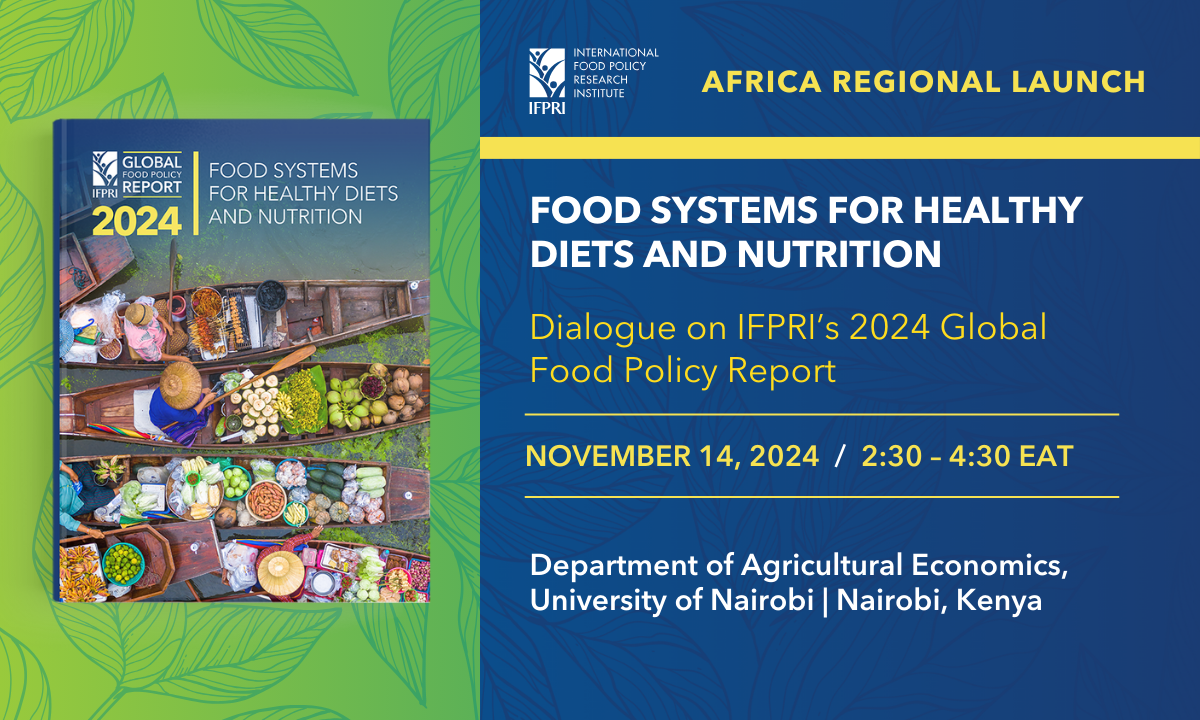
Food Systems for Healthy Diets and Nutrition: Africa Regional Launch of IFPRI’s 2024 Global Food Policy Report
Despite significant progress in addressing hunger and undernutrition in the early 2000s, malnutrition, in all its forms, remains a major challenge in all regions of the world. Unhealthy diets remain the primary drivers of many forms of malnutrition, including undernutrition, overweight and obesity, micronutrient deficiencies, and diet-related noncommunicable diseases. Today, the number of people who…
-

Improving Diets and Nutrition through Food Systems: What Will it Take? A Dialogue on IFPRI’s 2024 Global Food Policy Report
IFPRI’s 2024 Global Food Policy flagship publication arrives at a pivotal moment, as the importance of addressing food systems for better nutrition continues to gain global recognition. With United Nations Framework Convention on Climate Change (UNFCCC) 29th Conference of the Parties taking place in November, the SUN Global Gathering on the horizon and the Nutrition…
-
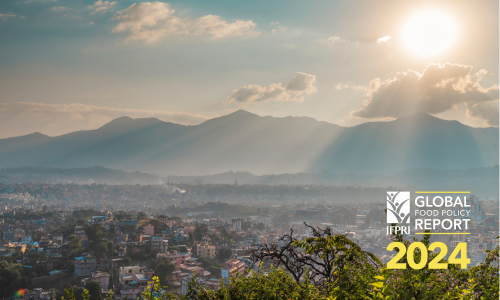
South Asia Launch | Nepal | 2024 Global Food Policy Report: Food Systems for Healthy Diets and Nutrition
Despite significant progress in addressing hunger and undernutrition in the early 2000s, malnutrition, in all its forms, remains a major challenge in all regions of the world. Unhealthy diets remain the primary drivers of many forms of malnutrition, including undernutrition, overweight and obesity, micronutrient deficiencies, and diet- related noncommunicable diseases. Today, the number of people…
Blogs
-
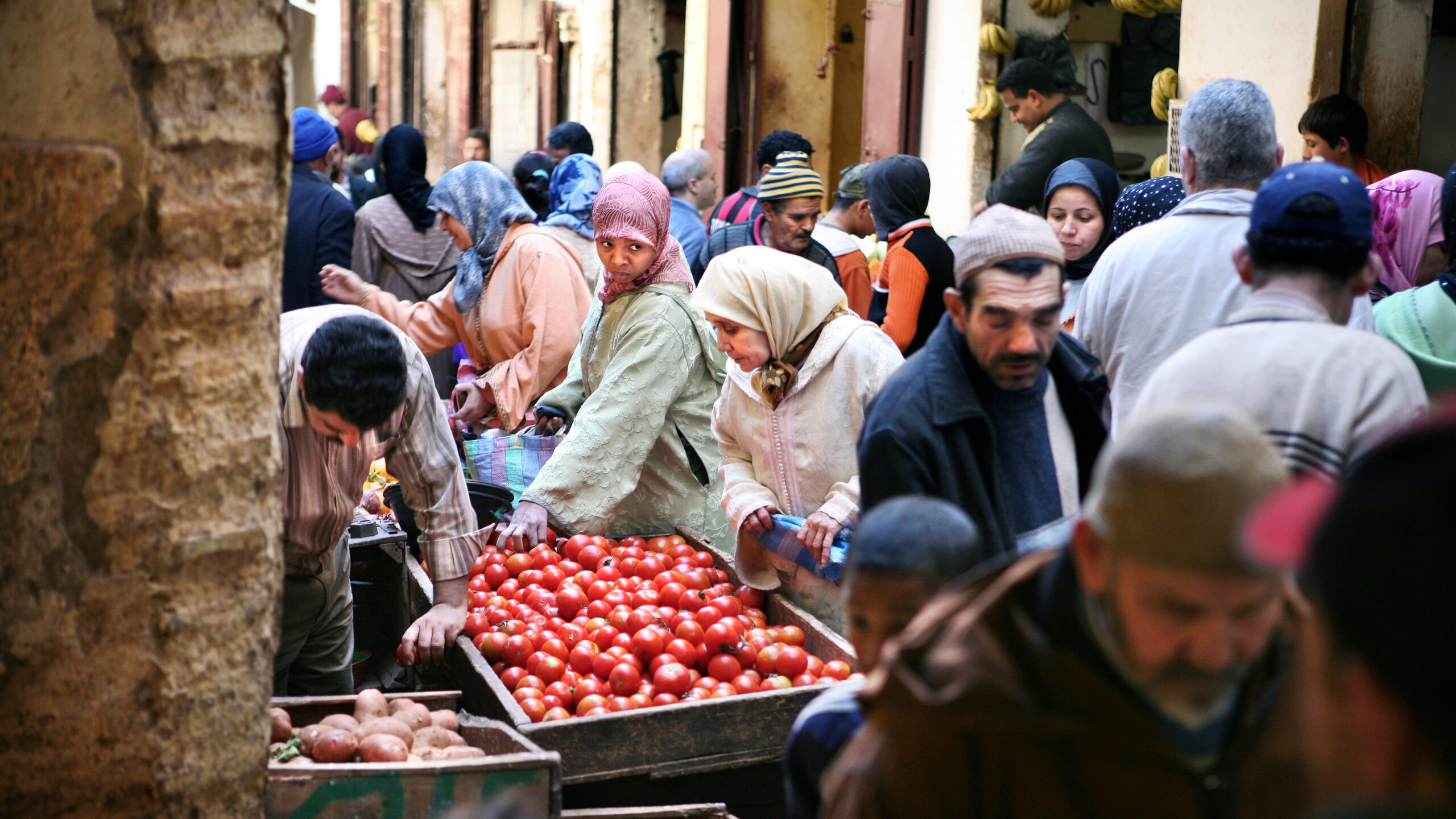
Global Food Policy Report 2024: Leveraging plant-source foods for sustainable healthy diets
Integrating more fruits, vegetables, and other high-quality crops into food systems.
-
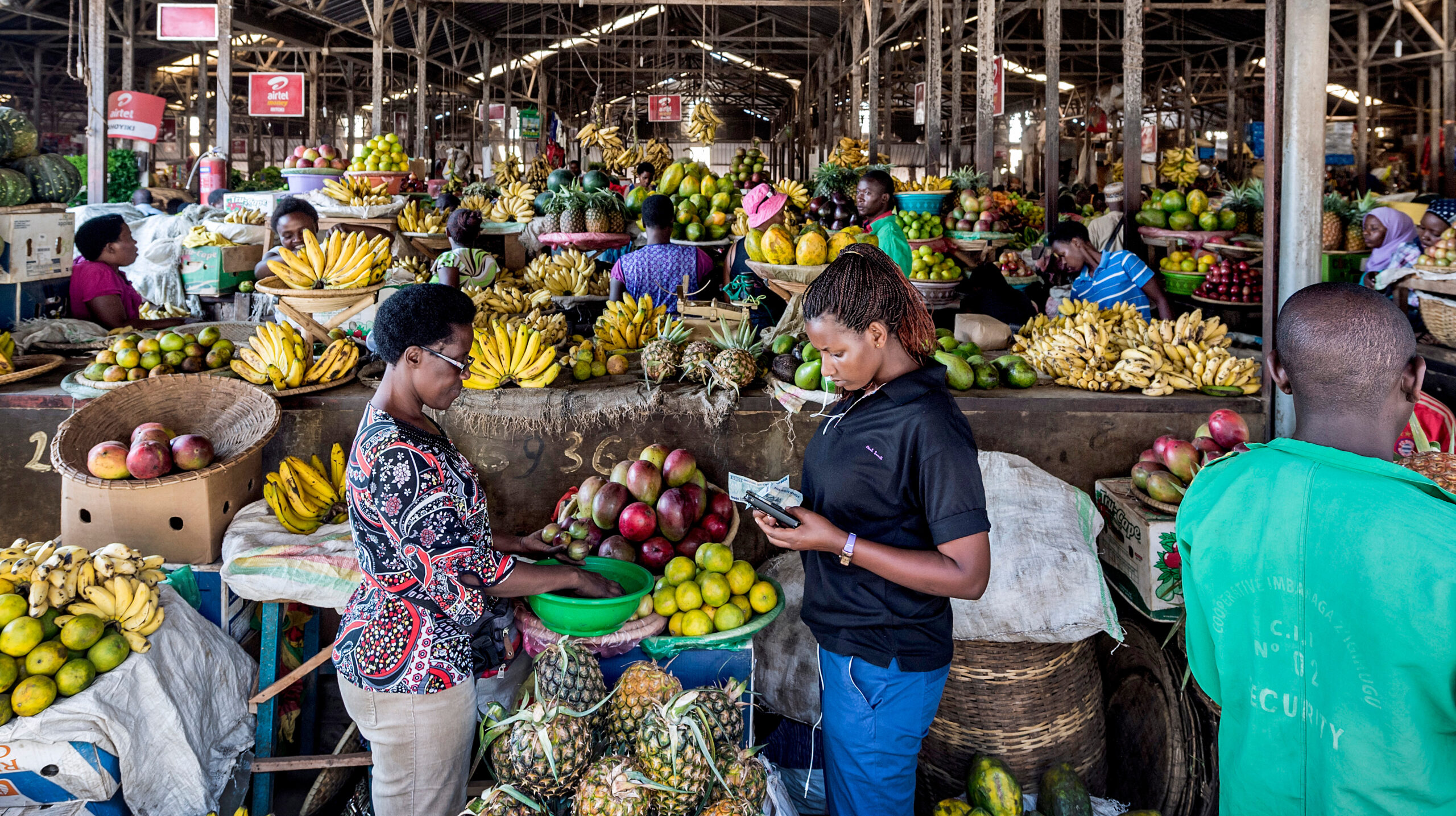
World Food Day 2024: The critical role of healthy diets for realizing the right to food
IFPRI’s 2024 Global Food Policy Report on a key paradigm shift.
-

Global Food Policy Report 2024: Improving governance to create supportive environments for diet and nutrition policies
Key steps to strengthen institutions and relationships
Past Reports
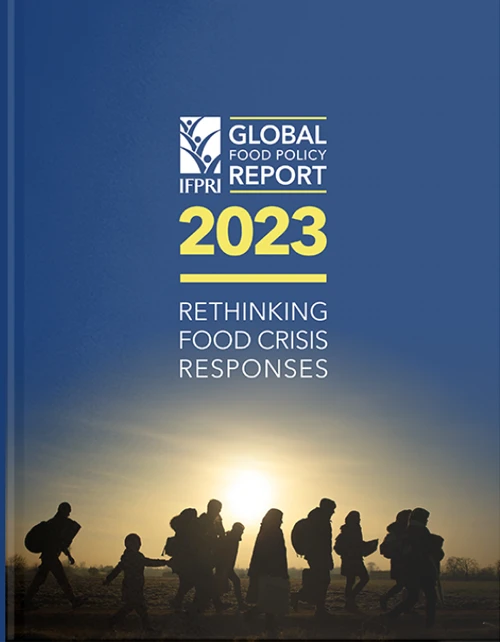
Book
Global food policy report 2023: Rethinking food crisis responses
2023International Food Policy Research Institute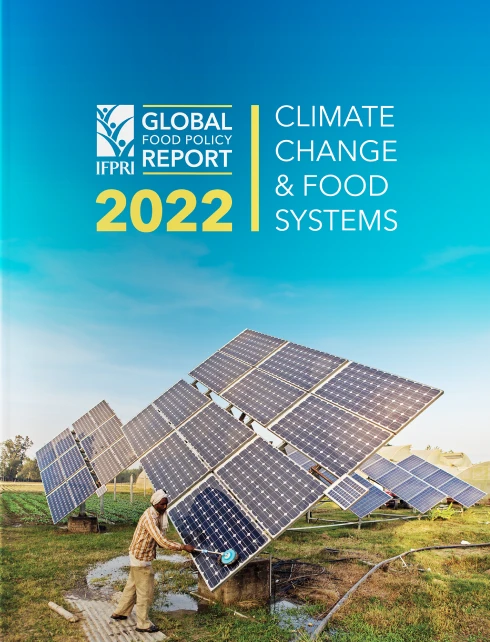
Book
2022 Global food policy report: Climate change and food systems
2022International Food Policy Research Institute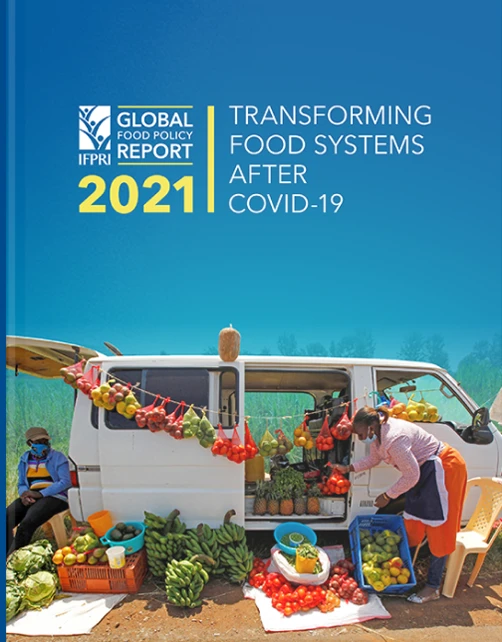
Book
2021 Global food policy report: Transforming food systems after COVID-19
2021International Food Policy Research Institute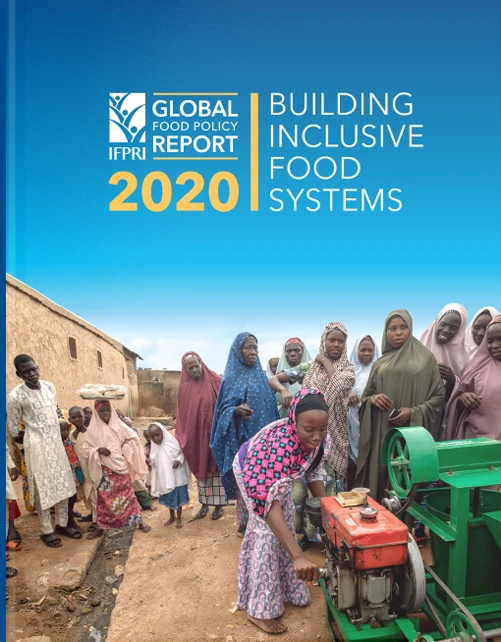
Book



